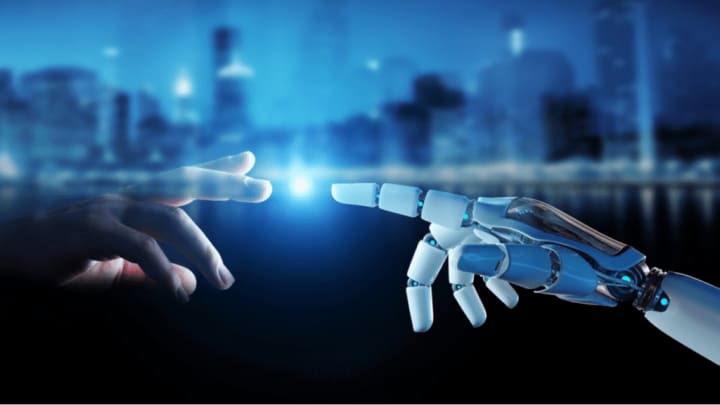Understanding AI: Risks, Benefits, and the Future of Artificial Intelligence
Exploring the Potential of AI in Healthcare, Transportation, Entertainment, and Beyond while Addressing Ethical, Social, and Environmental Challenges.

Artificial Intelligence, or AI for short, is a term that has been increasingly used in recent years to describe computer systems that are able to perform tasks that traditionally required human intelligence. AI is a rapidly growing field of research and development that has the potential to revolutionize many aspects of our lives, from healthcare to transportation, to entertainment and beyond. But what is AI, how does it work, and why is it such a big deal?
At its core, AI is about creating computer programs that can process and analyze large amounts of data to make predictions, recognize patterns, and make decisions based on that data. These computer programs are often modeled after the way that humans process information, using techniques such as machine learning, natural language processing, and computer vision.
Machine learning is a subset of AI that involves training algorithms to learn from data without being explicitly programmed. This is achieved by feeding large amounts of data into the algorithm and allowing it to identify patterns and correlations within the data. The algorithm can then use this information to make predictions or take actions based on new data it receives.
Natural language processing, or NLP, is another important aspect of AI that involves teaching computers to understand human language. This is particularly useful for applications such as virtual assistants, chatbots, and language translation software.
Computer vision is an AI technique that involves teaching computers to recognize and interpret visual information, such as images or videos. This is particularly useful for applications such as self-driving cars, facial recognition, and security systems.

So why is AI such a big deal? There are several reasons why AI has the potential to revolutionize many aspects of our lives. Firstly, AI can perform tasks that would be impossible or extremely difficult for humans to do, such as analyzing large amounts of data in a short amount of time or recognizing patterns in complex data sets.
Secondly, AI can improve efficiency and accuracy in many industries. For example, in healthcare, AI can be used to assist with diagnosis and treatment planning, reducing the risk of human error and improving patient outcomes. In manufacturing, AI can be used to optimize production processes, reducing waste and increasing efficiency.
Thirdly, AI can enable new forms of innovation and creativity. For example, AI can be used to generate new ideas and solutions to complex problems, or to create new forms of art and entertainment.

However, there are also concerns about the potential risks and negative consequences of AI. One of the biggest concerns is that AI could become harmful or dangerous if it is not properly designed, developed, and regulated. For example, AI could be used to create autonomous weapons or conduct cyberattacks.
Another concern is that AI could exacerbate existing social and economic inequalities. For example, AI could be used to automate jobs that are currently performed by humans, leading to job losses and economic disruption. In addition, AI could be used to create new forms of discrimination or bias, particularly in areas such as facial recognition and hiring algorithms.
Despite these concerns, the development of AI continues because of its potential benefits and economic and competitive pressures. However, it is important to ensure that AI is developed and used in a safe and responsible manner, with strong ethical and regulatory frameworks in place to mitigate the risks and ensure that AI is developed and used for the benefit of society as a whole.
One of the key challenges facing the development of AI is ensuring that it is developed in a way that is safe and ethical. This includes ensuring that AI systems are reliable and accurate, and that they do not cause harm to humans or the environment. It also involves addressing issues of bias and discrimination, and ensuring that AI is developed in a way that is transparent and accountable.
To address these challenges, there is a growing focus on the development of ethical frameworks and guidelines for the development and use of AI. These frameworks typically emphasize the importance of transparency, fairness, and accountability in the development of AI systems, and call for the involvement of diverse stakeholders, including experts in ethics, law, and policy, as well as members of affected communities.
Another challenge facing the development of AI is the need to ensure that it is developed in a way that is inclusive and equitable. This includes addressing issues of access and affordability, as well as ensuring that AI systems do not exacerbate existing social and economic inequalities.
To address these challenges, there is a growing focus on the development of AI systems that are designed with a focus on inclusivity and equity. This includes the development of AI systems that are accessible and affordable to all, as well as the development of AI systems that are designed with a focus on social and environmental sustainability.
Despite these challenges, the potential benefits of AI are significant, and the development of AI is likely to continue at a rapid pace in the coming years. This is because AI has the potential to revolutionize many aspects of our lives, from healthcare to transportation, to entertainment and beyond.
For example, in healthcare, AI is being used to assist with diagnosis and treatment planning, reducing the risk of human error and improving patient outcomes. In transportation, AI is being used to develop self-driving cars, which have the potential to reduce traffic accidents and congestion, as well as improve the efficiency and convenience of transportation.
In entertainment, AI is being used to create new forms of art and music, as well as to develop new forms of interactive storytelling and gaming. AI is also being used to develop new forms of communication and social interaction, including virtual assistants, chatbots, and social media platforms.

In conclusion, the development of AI has the potential to revolutionize many aspects of our lives, from healthcare to transportation, to entertainment and beyond. While there are concerns about the potential risks and negative consequences of AI, it is important to ensure that AI is developed and used in a safe and responsible manner, with strong ethical and regulatory frameworks in place to mitigate the risks and ensure that the benefits of AI are realized for the benefit of society as a whole.
About the Creator
Leo Waitere
A passionate advocate for positive change in the world. Concerned citizen and public figure, who is committed to using this platform to raise awareness about the problems facing our planet.






Comments
There are no comments for this story
Be the first to respond and start the conversation.